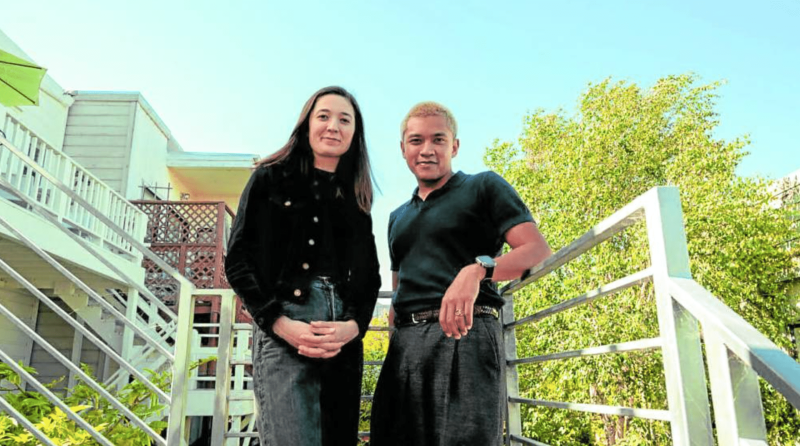TECH-SAVVY (From left) Anna Kazlauskas and Art Abal, Vana cofounders, met in 2018 at the Massachusetts Institute of Technology Media Lab. —CONTRIBUTED PHOTO
Data is the “new oil” that is fueling the artificial intelligence (AI) revolution. It provides the raw material from which machine learning algorithms derive insights that enable them to learn, adapt and make informed decisions.
AI is always hungry for new data to digest; however, it is hitting the tipping point or the “data wall” as publicly available databases get nearly depleted. Big tech companies are now seeking ways to access fresh, high-quality and nonpublic data sources to feed AI.
According to a report by the United Nations Commission on Science and Technology, data is now the new asset that is being exploited by big tech giants, mainly because it can be replicated for free and has multiple uses.
Filipino tech expert Arthur Abal says that “data is essentially a form of capital … Each person, including ordinary Filipinos, is sitting on a massive store of valuable data capital that companies are willing to pay for.” He further explains that user data is currently being bought and sold by companies, without the person’s consent and with no compensation as well.
The so-called monopolization of data is what the Iligan-born Abal wants to address with his tech startup called Vana. Built on blockchain technology, Vana seeks to give users complete control over their data. Derived from the word nirvana, he says that it provides a pathway “to liberate” Filipinos and exercise their legal rights to reclaim their data from these platforms.
Abal, a corporate lawyer who has a master’s degree in public policy from Harvard Kennedy School, cofounded Vana with Anna Kazlauskas.
Kazlauskas, whose mother is from Pampanga, studied computer science and economics at Massachusetts Institute of Technology (MIT). The pair met in 2018 during a class at MIT Media Lab, where they were asked to develop technology for emerging markets.
What they came up with was Toca, a project aimed at involving people in low-income areas by having them label data using their phones. But they had to eventually give up Toca to focus on their studies at MIT.
Valuable digital assets
After completing their studies, they worked on a research project aimed at revolutionizing data ownership.
The project resulted in a bold venture called Vana. Established in 2021 at the Open Data Labs in San Francisco, Vana aims to enable users to reclaim their data and carry it across applications.
The idea of a decentralized platform caught the eye of some of the leading crypto venture capitalists such as Paradigm and Polychain.
But how does Vana work? Abal explains that users can band together to collate their data and sell them to tech companies. “On-chain transactions on Vana make this process possible by allowing data to be grouped together and tokenized, unlocking its financial potential,” he adds. In cryptocurrency, tokens are considered digital assets that can be exchanged for valuable goods and services.
Abal says that the average Filipino owns hundreds of accounts across platforms. Every move that a user makes on the internet is a valuable asset that can be mined. “By securing and earning from their data, Filipinos can actively participate in the new data economy, creating new income opportunities and reclaiming value that would otherwise be locked away in corporate silos,” the 35-year-old says in an email interview.
DataDAO
An example of Vana’s real-world effect was the creation of The Reddit DataDAO (decentralized autonomous organization) in April 2024. DataDAO is defined as an entity, underpinned by blockchain technology, where all members have a say on what to do with their data set.
DataDAO allowed users to contribute their comment history into a pooled data set. It was a result of the Reddit users’ uproar when the social media platform had struck a $60-million deal with Google to sell user data for the purpose of training the tech giant’s AI.
A group of concerned users approached Vana with a proposal to create a DataDAO “to reclaim control over their data set that represented their contributions to the platform.” Abal says they thought they would acquire a “modest participation” for this experiment involving tokens to collect data.
Within a week, the initiative already amassed 140,000 participants. At this point, they knew they were on to something big. “This level of engagement was remarkable, especially considering that it can take months to collect even a fraction of that number of data points for similar initiatives,” Abal says.
Perhaps it was the outrage of the Reddit users that led to the massive participation in the DataDAO, he says. Another factor could be the token incentives that enticed users to join the movement, he points out.
“The Reddit DataDAO exemplified how tokenization and community mobilization could intersect to challenge the status quo, ultimately providing a new model for data ownership and financial empowerment,” he says.
Safety nets
Several safety nets have put in place to safeguard the data of each Vana user. The patented noncustodial techniques for data encryption and decryption allow users to secure their data using their crypto wallet keys. Abal explains that “only the user, who has access to their wallet, can unlock their data—no one else, not even Vana, can break this encryption.”
Asked how the general public can participate in this emerging economy, he says, the system is constantly being tweaked to operate in a mobile-friendly manner. Also, the DataDAOs within the ecosystem has user-friendly interfaces. According to him, Vana is a platform where anyone, regardless of technical background, will be able to benefit from the data economy.
According to Abal, Vana earns through a “gas fee,” which is required to conduct transactions on the Ethereum network. The “Vana token” is placed on every data transaction whenever an individual adds or uses data in the ecosystem.
In the Philippines, Vana’s technology allows AI to better understand local culture and languages, creating more inclusive technologies that genuinely represent the community.
This gained traction when Abal noticed that there is an “exclusionary gap” in AI models due to lack of available data. As a native Bisaya speaker, he noticed a dearth of websites presented in his native tongue. It was not a surprise for him: AI models are generally trained in the English language.
“This exclusionary gap can be addressed by providing AI models with access to real data from diverse communities. Allowing people to contribute their data in a way that is representative of their language, culture and unique needs enables AI to become more inclusive and balanced,” he adds.
On a personal note, Abal shares that his biggest takeaway from setting up this tech company is that “simple problems can be incredibly complex and challenging to solve.“ He adds, “The technical, economic and social challenges involved are significant, and solving them requires constant innovation, collaboration and perseverance.”


